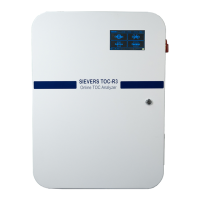MODBUS CONFIGURATION
Appendix C
Sievers TOC-R3 Operation and Maintenance Manual
DLM 95000-01 EN Rev. A 265 © Veolia 2023
MODBUS REGISTER MAP AND DESCRIPTIONS
The following table lists the register map for the Analyzer Modbus data details and descriptions.
The Analyzer implements the Modbus TCP/IP standard. (For more information about Modbus,
see www.modbus.org
.)
The table below provides information about the Modbus register map for the Analyzer. A Modbus
register map is a list of registers that are used for storing data in a Sievers TOC-R3. Each register
contains 16 bits of data, and they are identified by unique addresses.
The register map in the table provides details about the data that is stored in each register, tag
name, and unit as well as a description of its purpose. This information is important for the Users
who want to read or write data to the Analyzer using Modbus communication.
For example, the table may list the starting and ending register addresses for specific data types
such as TOC, TN, TIC, POC/VOC measurement results, sensor values, and more details. It may
also provide information about the format of the data, such as whether it is in binary, integer, or
floating-point format.
By understanding the register map, users can effectively communicate with the Analyzer using
Modbus commands to read or write data. This information is particularly useful for system
integrators, technicians, or engineers who are responsible for integrating the Aanlyzer into a
larger control system.
The table below displays the available Modbus functions. Refer to the Client Access column to
determine if the signal is Read or Write, or both (if both columns are marked with an “X”).
If there are variations in the SCADA software used, contact the supplier to understand for
assistance in understanding how the software compares to the Modbus standard.
See Table C-2, “Modbus Register Table,” on page 266
.

